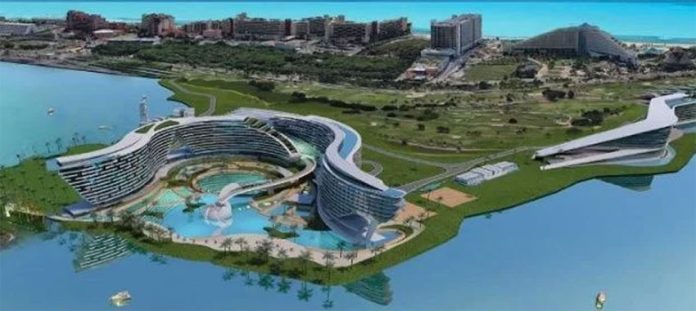An environmental group has spoken out against the 3,000-room hotel planned for Cancún, Quintana Roo, and is considering the possibility of taking legal action against it.
President López Obrador and Tourism Secretary Miguel Torruco announced last week that the Grand Island Cancún project is going ahead. The Secretariat of the Environment (Semarnat) granted approval for construction in July.
Araceli Domínguez, president of the Ecologist Group of the Mayab (Gema), told the newspaper El Economista that the construction and operation of the hotel will place excessive pressure on local water supplies and other basic services.
Cancún’s hotel zone, where the project will be built, started showing signs of overdevelopment 10 years ago, she said.
The activist also pointed out that the Mexican Center for Environmental Law has demonstrated that there were irregularities in Semarnat’s decision to approve the hotel.
One was that an application for a real estate project on one of the two parcels of land on which the hotel will be built was previously rejected on environmental grounds, Domínguez said.
She added that BVG World, one of two companies that will build the two-stage mega project, has previously been sanctioned for the illegal removal of mangroves.
Francisco Córdova Lira, a former president of the Caribbean branch of the Business Coordinating Council, also questioned the hotel project.He said it was strange that such a large project had been approved on a site where a smaller project was previously rejected due to the fragility of the coastal environment.
The hotel site is located on Kukulcán boulevard near the Nichupté Lagoon Natural Protected Area but the developers say that neither flora nor fauna will be adversely affected by the construction.
Gema, however, is unconvinced and along with other environmental groups is assessing how it might go about legally opposing the project.
The group previously opposed the Malecón Tajamar project, a planned commercial and residential development in Cancún that was shut down by the environmental protection agency, Profepa, in 2017.
Quintana Roo Governor Carlos Joaquín González also said that the Grand Island project will place significant pressure on local services, while El Economista contended that the construction and operation of the hotel will further snarl traffic on Kukulcán boulevard because thousands of workers will use the road on a daily basis.
Real estate developer Miguel Ángel Lemus said the companies building the project must be very careful to ensure that they comply with all environmental regulations. If they fail to do so, he said, there is a risk that the hotel will be canceled.
The first stage of the project, which includes the construction of 2,000 hotel rooms as well as guest amenities, a convention center, swimming pools and a parking lot, is expected to open in 2022. A further 1,000 rooms and more amenities will be built in the second stage, which is slated for completion in 2024.
BVG World and Murano will invest more than US $1 billion to build the Grand Island Cancún. Tourism Secretary Torruco said the outlay is “one of the biggest investments in a hotel in the past 30 years.”
Source: El Economista (sp)
